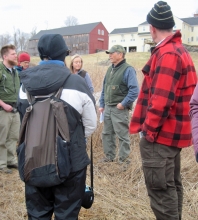You are here
New Research: Assessing Tools for Woodland Landowners

Harvard Forest Senior Investigator Dave Kittredge, in partnership with the UMass Family Forest Research Center, recently completed a two-year study of the USDA Forest Service's national Forest Stewardship Program (FSP). The results are now available in the Journal of Forestry.
Their results indicate that only a small fraction of the nation's private landowners directly benefit from FSP though technical assistance, management planning and cost-sharing or subsidy of management activities. They recommend that FSP engagement could be enhanced by shifting to new outreach strategies, such as increasing the number of relationships between professional foresters and landowners by supporting one-on-one visits, educational opportunities, and peer-to-peer learning.
The study was based on a wide variety of analyses, including data from the National Woodland Owner Survey, a survey of FSP administrators at the state level, review of the relevant literature, focus groups of landowners around the US, and analyses of FSP evaluation data compiled by the Forest Service.
Decisions made by private woodland owners are important at the landscape level. The New England forest landscape is largely privately owned, and landowner decision-making can have significant cumulative effects on ecosystem benefits both locally and regionally.
- Read the paper, "Effectiveness of Landowner Assistance Activities: An Examination of the USDA Forest Service's Forest Stewardship Program" in the Journal of Forestry
- Learn more about the Harvard Forest's land management and conservation efforts.
(Photo of a woodland landowner meeting by Dave Kittredge)

